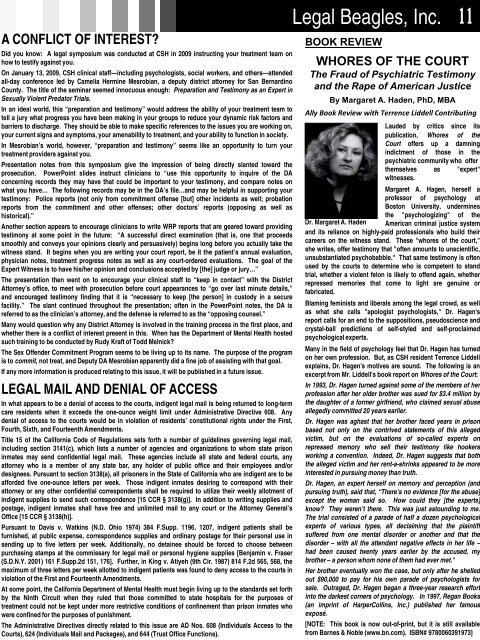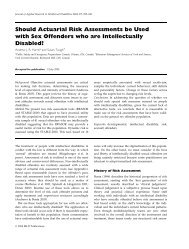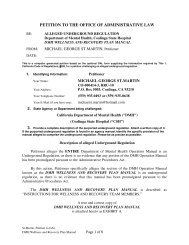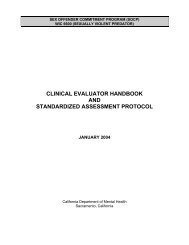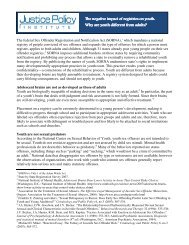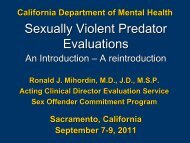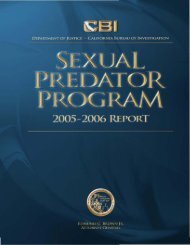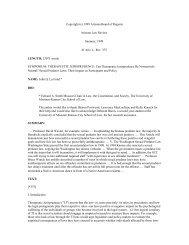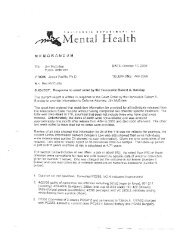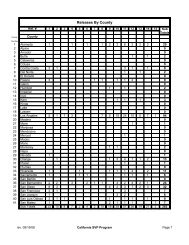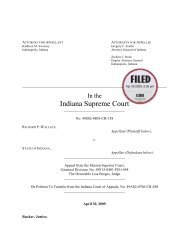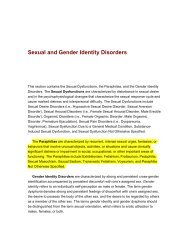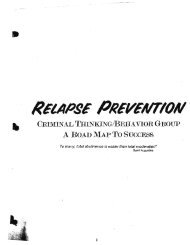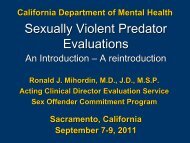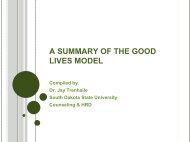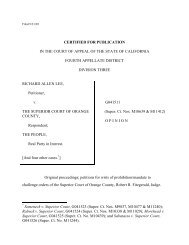UNCENSORED version of the March 2010 edition ... - Defense for SVP
UNCENSORED version of the March 2010 edition ... - Defense for SVP
UNCENSORED version of the March 2010 edition ... - Defense for SVP
You also want an ePaper? Increase the reach of your titles
YUMPU automatically turns print PDFs into web optimized ePapers that Google loves.
A CONFLICT OF INTEREST<br />
Did you know: A legal symposium was conducted at CSH in 2009 instructing your treatment team on<br />
how to testify against you.<br />
On January 13, 2009, CSH clinical staff—including psychologists, social workers, and o<strong>the</strong>rs—attended<br />
all-day conference led by Camelia Hermine Mesrobian, a deputy district attorney <strong>for</strong> San Bernardino<br />
County. The title <strong>of</strong> <strong>the</strong> seminar seemed innocuous enough: Preparation and Testimony as an Expert in<br />
Sexually Violent Predator Trials.<br />
In an ideal world, this “preparation and testimony” would address <strong>the</strong> ability <strong>of</strong> your treatment team to<br />
tell a jury what progress you have been making in your groups to reduce your dynamic risk factors and<br />
barriers to discharge. They should be able to make specific references to <strong>the</strong> issues you are working on,<br />
your current signs and symptoms, your amenability to treatment, and your ability to function in society.<br />
In Mesrobian’s world, however, “preparation and testimony” seems like an opportunity to turn your<br />
treatment providers against you.<br />
Presentation notes from this symposium give <strong>the</strong> impression <strong>of</strong> being directly slanted toward <strong>the</strong><br />
prosecution. PowerPoint slides instruct clinicians to “use this opportunity to inquire <strong>of</strong> <strong>the</strong> DA<br />
concerning records <strong>the</strong>y may have that could be important to your testimony, and compare notes on<br />
what you have… The following records may be in <strong>the</strong> DA’s file…and may be helpful in supporting your<br />
testimony: Police reports (not only from commitment <strong>of</strong>fense [but] o<strong>the</strong>r incidents as well; probation<br />
reports from <strong>the</strong> commitment and o<strong>the</strong>r <strong>of</strong>fenses; o<strong>the</strong>r doctors’ reports (opposing as well as<br />
historical).”<br />
Ano<strong>the</strong>r section appears to encourage clinicians to write WRP reports that are geared toward providing<br />
testimony at some point in <strong>the</strong> future: “A successful direct examination (that is, one that proceeds<br />
smoothly and conveys your opinions clearly and persuasively) begins long be<strong>for</strong>e you actually take <strong>the</strong><br />
witness stand. It begins when you are writing your court report, be it <strong>the</strong> patient’s annual evaluation,<br />
physician notes, treatment progress notes as well as any court-ordered evaluations. The goal <strong>of</strong> <strong>the</strong><br />
Expert Witness is to have his/her opinion and conclusions accepted by [<strong>the</strong>] judge or jury…”<br />
The presentation <strong>the</strong>n went on to encourage your clinical staff to “keep in contact” with <strong>the</strong> District<br />
Attorney’s <strong>of</strong>fice, to meet with prosecution be<strong>for</strong>e court appearances to “go over last minute details,”<br />
and encouraged testimony finding that it is “necessary to keep [<strong>the</strong> person] in custody in a secure<br />
facility.” The slant continued throughout <strong>the</strong> presentation; <strong>of</strong>ten in <strong>the</strong> PowerPoint notes, <strong>the</strong> DA is<br />
referred to as <strong>the</strong> clinician’s attorney, and <strong>the</strong> defense is referred to as <strong>the</strong> “opposing counsel.”<br />
Many would question why any District Attorney is involved in <strong>the</strong> training process in <strong>the</strong> first place, and<br />
whe<strong>the</strong>r <strong>the</strong>re is a conflict <strong>of</strong> interest present in this. When has <strong>the</strong> Department <strong>of</strong> Mental Health hosted<br />
such training to be conducted by Rudy Kraft <strong>of</strong> Todd Melnick<br />
The Sex Offender Commitment Program seems to be living up to its name. The purpose <strong>of</strong> <strong>the</strong> program<br />
is to commit, not treat, and Deputy DA Mesrobian apparently did a fine job <strong>of</strong> assisting with that goal.<br />
If any more in<strong>for</strong>mation is produced relating to this issue, it will be published in a future issue.<br />
LEGAL MAIL AND DENIAL OF ACCESS<br />
In what appears to be a denial <strong>of</strong> access to <strong>the</strong> courts, indigent legal mail is being returned to long-term<br />
care residents when it exceeds <strong>the</strong> one-ounce weight limit under Administrative Directive 608. Any<br />
denial <strong>of</strong> access to <strong>the</strong> courts would be in violation <strong>of</strong> residents’ constitutional rights under <strong>the</strong> First,<br />
Fourth, Sixth, and Fourteenth Amendments.<br />
Title 15 <strong>of</strong> <strong>the</strong> Cali<strong>for</strong>nia Code <strong>of</strong> Regulations sets <strong>for</strong>th a number <strong>of</strong> guidelines governing legal mail,<br />
including section 3141(c), which lists a number <strong>of</strong> agencies and organizations to whom state prison<br />
inmates may send confidential legal mail. These agencies include all state and federal courts, any<br />
attorney who is a member <strong>of</strong> any state bar, any holder <strong>of</strong> public <strong>of</strong>fice and <strong>the</strong>ir employees and/or<br />
designees. Pursuant to section 3138(a), all prisoners in <strong>the</strong> State <strong>of</strong> Cali<strong>for</strong>nia who are indigent are to be<br />
af<strong>for</strong>ded five one-ounce letters per week. Those indigent inmates desiring to correspond with <strong>the</strong>ir<br />
attorney or any o<strong>the</strong>r confidential correspondents shall be required to utilize <strong>the</strong>ir weekly allotment <strong>of</strong><br />
indigent supplies to send such correspondence [15 CCR § 3138(g)]. In addition to writing supplies and<br />
postage, indigent inmates shall have free and unlimited mail to any court or <strong>the</strong> Attorney General’s<br />
Office [15 CCR § 3138(h)].<br />
Pursuant to Davis v. Watkins (N.D. Ohio 1974) 384 F.Supp. 1196, 1207, indigent patients shall be<br />
furnished, at public expense, correspondence supplies and ordinary postage <strong>for</strong> <strong>the</strong>ir personal use in<br />
sending up to five letters per week. Additionally, no detainee should be <strong>for</strong>ced to choose between<br />
purchasing stamps at <strong>the</strong> commissary <strong>for</strong> legal mail or personal hygiene supplies [Benjamin v. Fraser<br />
(S.D.N.Y. 2001) 161 F.Supp.2d 151, 176]. Fur<strong>the</strong>r, in King v. Atiyeh (9th Cir. 1987) 814 F.2d 565, 568, <strong>the</strong><br />
maximum <strong>of</strong> three letters per week allotted to indigent patients was found to deny access to <strong>the</strong> courts in<br />
violation <strong>of</strong> <strong>the</strong> First and Fourteenth Amendments.<br />
At some point, <strong>the</strong> Cali<strong>for</strong>nia Department <strong>of</strong> Mental Health must begin living up to <strong>the</strong> standards set <strong>for</strong>th<br />
by <strong>the</strong> Ninth Circuit when <strong>the</strong>y ruled that those committed to state hospitals <strong>for</strong> <strong>the</strong> purposes <strong>of</strong><br />
treatment could not be kept under more restrictive conditions <strong>of</strong> confinement than prison inmates who<br />
were confined <strong>for</strong> <strong>the</strong> purposes <strong>of</strong> punishment.<br />
The Administrative Directives directly related to this issue are AD Nos. 608 (Individuals Access to <strong>the</strong><br />
Courts), 624 (Individuals Mail and Packages), and 644 (Trust Office Functions).<br />
Legal Beagles, Inc. 11<br />
BOOK REVIEW<br />
WHORES OF THE COURT<br />
The Fraud <strong>of</strong> Psychiatric Testimony<br />
and <strong>the</strong> Rape <strong>of</strong> American Justice<br />
By Margaret A. Haden, PhD, MBA<br />
Ally Book Review with Terrence Liddell Contributing<br />
Lauded by critics since its<br />
publication, Whores <strong>of</strong> <strong>the</strong><br />
Court <strong>of</strong>fers up a damning<br />
indictment <strong>of</strong> those in <strong>the</strong><br />
psychiatric community who <strong>of</strong>fer<br />
<strong>the</strong>mselves as "expert"<br />
witnesses.<br />
Margaret A. Hagen, herself a<br />
pr<strong>of</strong>essor <strong>of</strong> psychology at<br />
Boston University, undermines<br />
<strong>the</strong> "psychologizing" <strong>of</strong> <strong>the</strong><br />
Dr. Margaret A. Haden American criminal justice system<br />
and its reliance on highly-paid pr<strong>of</strong>essionals who build <strong>the</strong>ir<br />
careers on <strong>the</strong> witness stand. These "whores <strong>of</strong> <strong>the</strong> court,"<br />
she writes, <strong>of</strong>fer testimony that "<strong>of</strong>ten amounts to unscientific,<br />
unsubstantiated psychobabble." That same testimony is <strong>of</strong>ten<br />
used by <strong>the</strong> courts to determine who is competent to stand<br />
trial, whe<strong>the</strong>r a violent felon is likely to <strong>of</strong>fend again, whe<strong>the</strong>r<br />
repressed memories that come to light are genuine or<br />
fabricated.<br />
Blaming feminists and liberals among <strong>the</strong> legal crowd, as well<br />
as what she calls "apologist psychologists," Dr. Hagen's<br />
report calls <strong>for</strong> an end to <strong>the</strong> suppositions, pseudoscience and<br />
crystal-ball predictions <strong>of</strong> self-styled and self-proclaimed<br />
psychological experts.<br />
Many in <strong>the</strong> field <strong>of</strong> psychology feel that Dr. Hagen has turned<br />
on her own pr<strong>of</strong>ession. But, as CSH resident Terrence Liddell<br />
explains, Dr. Hagen's motives are sound. The following is an<br />
excerpt from Mr. Liddell's book report on Whores <strong>of</strong> <strong>the</strong> Court:<br />
In 1993, Dr. Hagen turned against some <strong>of</strong> <strong>the</strong> members <strong>of</strong> her<br />
pr<strong>of</strong>ession after her older bro<strong>the</strong>r was sued <strong>for</strong> $3.4 million by<br />
<strong>the</strong> daughter <strong>of</strong> a <strong>for</strong>mer girlfriend, who claimed sexual abuse<br />
allegedly committed 20 years earlier.<br />
Dr. Hagen was aghast that her bro<strong>the</strong>r faced years in prison<br />
based not only on <strong>the</strong> contrived statements <strong>of</strong> this alleged<br />
victim, but on <strong>the</strong> evaluations <strong>of</strong> so-called experts on<br />
repressed memory who sell <strong>the</strong>ir testimony like hookers<br />
working a convention. Indeed, Dr. Hagen suggests that both<br />
<strong>the</strong> alleged victim and her rent-a-shrinks appeared to be more<br />
interested in pursuing money than truth.<br />
Dr. Hagen, an expert herself on memory and perception (and<br />
pursuing truth), said that, “There’s no evidence [<strong>for</strong> <strong>the</strong> abuse]<br />
except <strong>the</strong> woman said so. How could <strong>the</strong>y [<strong>the</strong> experts]<br />
know They weren’t <strong>the</strong>re. This was just astounding to me.<br />
The trial consisted <strong>of</strong> a parade <strong>of</strong> half a dozen psychological<br />
experts <strong>of</strong> various types, all declaiming that <strong>the</strong> plaintiff<br />
suffered from one mental disorder or ano<strong>the</strong>r and that <strong>the</strong><br />
disorder – with all <strong>the</strong> attendant negative effects in her life –<br />
had been caused twenty years earlier by <strong>the</strong> accused, my<br />
bro<strong>the</strong>r – a person whom none <strong>of</strong> <strong>the</strong>m had ever met."<br />
Her bro<strong>the</strong>r eventually won <strong>the</strong> case, but only after he shelled<br />
out $90,000 to pay <strong>for</strong> his own parade <strong>of</strong> psychologists <strong>for</strong><br />
sale. Outraged, Dr. Hagen began a three-year research ef<strong>for</strong>t<br />
into <strong>the</strong> darkest corners <strong>of</strong> psychology. In 1997, Regan Books<br />
(an imprint <strong>of</strong> HarperCollins, Inc.) published her famous<br />
exposé.<br />
[NOTE: This book is now out-<strong>of</strong>-print, but it is still available<br />
from Barnes & Noble (www.bn.com). ISBN# 9780060391973]


